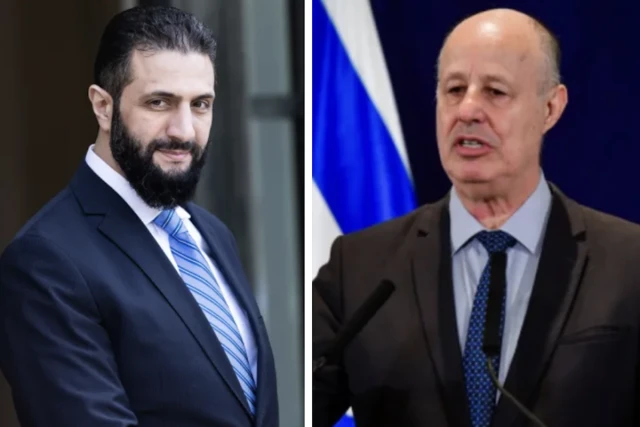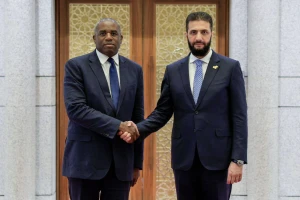Israeli national security advisor and Syrian president reportedly meet in UAE – both sides issue denials

Unnamed Syrian sources claimed that Israeli National Security Council head, Tzachi Hanegbi, a close ally of Prime Minister Benjamin Netanyahu, met on Monday with Syrian President Ahmad al‑Sharaa in Abu Dhabi, the capital of the United Arab Emirates. The sources described the alleged encounter as “a significant step in the Syrian–Israeli negotiations” and asserted that it was not the first meeting between the two men.
However, according to Ynet News, both Israeli and Syrian officials have firmly denied that any such meeting took place.
A source from Syria’s Information Ministry told the local news channel Al-Akhbariya, “There is no truth to what is being circulated regarding meetings or discussions held between President Ahmad al-Sharaa and Israeli officials.”
Hanegbi also reportedly denied meeting with the Syrian leader.
Israel and Syria currently have no formal diplomatic relations and remain technically at war, stemming from Syria’s participation in the multi-front Arab attacks on the Jewish state in 1948, 1967 and 1973.
Syria has so far refused to recognize Israel or establish diplomatic relations with the Jewish state. However, the fall of the former Assad regime last December appears to have shifted the dynamics.
Although al-Sharaa was previously associated with jihadist groups linked to Al-Qaeda, he now states that he has renounced violence and is pursuing peaceful engagement with the broader international community, including the Jewish state.
As recently as May, reports indicated that Syrian and Israeli officials had held several de-escalation talks. An informed source noted that the discussions were focused on “peace as the absence of war, rather than normalization.”
In late May, al-Sharaa told the U.S. weekly Jewish Journal that “Israel is a future security partner.”
Despite the shift, the Israeli government has remained cautious, citing al-Sharaa’s past ties to terrorism. However, following U.S. President Donald Trump’s decision to lift sanctions on Syria, Israeli Prime Minister Benjamin Netanyahu reportedly informed Washington’s new Syria envoy, Tom Barrack, that Israel is open to a security agreement – and potentially even a peace deal – with Syria.
Speculation has been growing that Syria might eventually join the Abraham Accords, thereby extending the U.S.-brokered peace framework between Israel and the broader Arab world.
In May, Israeli Ambassador to the United States Yechiel Leiter suggested that a peace agreement between Israel and Syria could materialize before a normalization deal with Saudi Arabia.
"We have dramatically changed the paradigm there. I'm very upbeat about the potential for an Abraham Accord with Syria and Lebanon, and that may actually precede Saudi Arabia," Leiter stated at the time.
Last week, unnamed diplomatic sources indicated that the Syrian regime is currently advancing “quiet” negotiations with Israel. While the negotiations could potentially lead to a peace agreement, the current focus is reportedly on establishing a limited security agreement between the two countries.
“Anyone imagining eating falafel in Damascus should keep dreaming,” one informed source said, dismissing the prospect of full diplomatic ties with the exchange of embassies. However, anything could happen in the volatile and rapidly changing Middle East.
Although Israel remains cautious toward the al-Sharaa administration, the two countries share a common adversary: the Islamic Republic of Iran. In contrast to the former Assad government, al-Sharaa has been openly critical of Tehran’s leadership.
The Israeli Air Force (IAF) reportedly used Syrian airspace extensively during last month’s Israeli Operation Rising Lion campaign against Iran’s military and nuclear assets. Although the Syrian regime was unable to prevent IAF jets from operating in its airspace, the Israeli strikes indirectly strengthened al-Sharaa's administration by significantly weakening its chief rival, Iran.
Following his meeting with Trump, al-Sharaa pledged that Syria would position itself as a partner for peace and cooperation.
“Syria is committed to being a country of peace and cooperation and faithful to every good hand extended toward it,” he stated. “Syria will no longer be a battleground for power struggles or a stage for foreign ambitions. We will not allow Syria to be divided or revive the narratives of the former regime that sought to fracture our people. Syria belongs to all Syrians.”
Given the country's current economic challenges and dependence on U.S. and Western financial and political support, al-Sharaa may be open to signing a full peace agreement with Israel, provided the conditions are under the right circumstances.

The All Israel News Staff is a team of journalists in Israel.
You might also like to read this:










